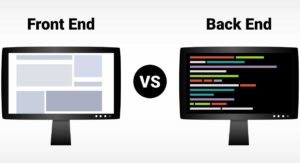There is a great demand today for web pages and mobile applications. People can’t get enough websites to visit or apps to facilitate their online browsing experience. This demand translates into more development positions.
But if you’re a full stack developer, you probably need guidance regarding where you want to settle down and build your career. So many companies need developers, but who offers the best full stack web developer salary?
This article explores full stack web developer salaries, including a breakdown by experience level, location, jobs, and industry. We’ll also tell you whether it’s worth pursuing a full stack web developer career and how you can become a better full stack web developer.
But before we dive deep into full stack web development salary scenarios, let’s pause and define the “full stack” term.
What Exactly is Full Stack Development?
Web applications and websites consist of two primary components. First, there’s the front-end, which includes the user interface (UI) and is where people interact with the web resource. It encompasses elements like navigation, visual effects, frames, and forms. The front-end deals primarily with the user experience and uses HTML, CSS, and JavaScript as programming languages. Second, Front-end developers handle the client side of web development.
Then there’s the back-end, which covers the application workflows and business logic, security, and performance, all the things that run in the background. The back-end connects the application to other databases and services and involves programming languages like Python, Java, R, Ruby, Node.js, and PHP. In addition, back-end developers handle the server side of web development.
Full stack development involves the entire process, an end-to-end application process that encompasses both the front and back-ends.
What Does a Full Stack Developer Do?
A full stack developer takes care of the entire application from end to end. Therefore, full stack developers must be familiar with the whole technology stack (the set of technologies used to create an end-to-end application efficiently and quickly).
Here’s a list of responsibilities typically assigned to a full stack developer.
- Switch between different responsibilities in the project on a daily or weekly basis
- Write code in various front and back-end languages
- Set up and modify databases
- Create functioning website prototypes
- Work with different sets of frameworks and libraries
- Create a functional user experience for the front-end
- Work with version control software (e.g., Git)
- Debug and troubleshoot any database queries or other issues that arise on the website
- Help developers across the project’s lifecycle and collaborate on developing a viable architecture
- Work alongside graphic designers to render their designs into code
What Skills Does a Full Stack Developer Need?
If you look closely at the above job responsibilities, you may think that full stack developers need a robust selection of skills to do the job properly, and you’d be right. Here are the skills a beginner full stack developer needs to start earning that cool entry-level full stack web developer salary.
- Front-end coding technologies like HTML, CSS, and JavaScript
- At least one back-end programming language, such as Python, Ruby on Rails, or Java
- A good grasp of SQL and NoSQL database technologies
- A working understanding of user interface (UI) and user experience (UX) design principles
- Knowledge of version control systems
- Experience in web services and application programming interfaces (APIs)
- Understanding of at least one of these full stacks:
- LAMP
- LEMP
- MEAN
- MERN
Even if you don’t possess all these skills at the same level of proficiency, you can still get by with at least a working knowledge of the above, then slowly build up and expand your skill set to start earning your entry-level full stack web developer salary.
Read more: An Ultimate Guide to Full Stack Developer Skills
What’s the Average Full Stack Web Developer Salary?
Now it’s time to get into the heart of the matter: learning about a full stack web developer salary. We begin with the average full stack developer salary in the United States, which according to Indeed.com is $118,009 annually.
Now, that figure is just an average and doesn’t consider any mitigating circumstances. But we’re about to see that a full stack web development salary can vary due to location, experience and skill level, industry, and other cases.
Full Stack Web Developer Salary by U.S. City
Not every city in the United States pays the same full stack web developer city. Location matters. Here are the top-paying American cities for full stack web developers.
- McLean, VA. $138,409 per year
- Los Angeles, CA. $133,896 per year
- New York, NY. $128,952 per year
- Seattle, WA. $126,391 per year
- San Diego, CA. $126,196 per year
- Austin, TX. $126,191 per year
- Chicago, IL. $124,718 per year
- Charlotte, NC. $114,284 per year
- Atlanta, GA. $110,963 per year
Full Stack Web Developer Salary by Experience Level
As in any other industry or vocation, full stack developers with experience command better salaries than their rookie counterparts. Here’s the salary breakdown for full stack developers based on experience level, as reported by Glassdoor.com.
- 0-1. $74,756 per year
- 1-3 Years. $76,153 per year
- 4-6 Years. $87,216 per year
- 7-9 Years. $96,238 per year
- 10-14 Years. $106,022 per year
- 15+ Years. $122,093 per year
For reference’s sake, zero to one year is entry-level, and anything over ten years is paid a senior full stack web developer salary.
Full Stack Web Developer Salary by Industry & Company
Every industry places a different priority on web apps, so there’s a variance in what they will offer for a full stack developer. According to Glassdoor.com, these industries pay the best full stack web developer salary.
- Human Resources and Staffing. $135,254 per year. This salary is 17% higher than other industries.
- Hotels and Travel Accommodations. $134,957 per year. This salary is 16% higher than other industries.
- Energy, Mining, and Utilities. $131,909 per year. This salary is 14% higher than other industries.
- Telecommunications. $126,990 per year. This salary is 11% higher than other industries.
- Real Estate. $124,120 per year. This salary is 9% higher than other industries.
And here is a sampling of what a dozen companies are paying full stack web developers today, also courtesy of Glassdoor.
- eBay. $172,224 per year
- Amazon. $146,064 per year
- CyberCoders. $137,189 per year
- Robert Half. $134,414 per year
- IBM. $125,809 per year
- City National Bank. $123,791 per year
- Barclays. $122,035 per year
- Fannie Mae. $117,548 per year
- Revature. $110,966 per year
- Booz Allen Hamilton. $108,570 per year
- Leidos. $104,743 per year
- Infosys. $95,949 per year
Best Paying Jobs for Full Stack Web Developer Positions
Ziprecruiter.com lists five jobs related to full stack web development but pays considerably more. These positions and others like them are great possible future destinations for the full stack web developer looking for a change.
- Principal Full Stack Engineer. $175,833 per year
- Full Stack Developer Architect. $154,785 per year
- Senior Lead Software Engineer. $151,425 per year
- Senior Full Stack Engineer. $139,497 per year.
- Stack Infrastructure. $135,789 per year.
Is it Worth Becoming a Full Stack Developer?
Full stack developers do everything, so they need to have the skills to back them up, and that’s a lot to learn. The question is, is it really worth the trouble? For starters, here’s a quick list of full stack developer advantages, things that today’s competitive businesses highly value.
- They have complete ownership and understanding of a given project
- They are a cost-effective solution, saving project time and cost while increasing productivity.
- Since they know the entire process and system, they can fix bugs faster
- They have a better view of the big picture, so they can easily impart knowledge to other team members
- They are conducive to better division of work amongst project team members
Full stack developers bring efficiency and versatility to any IT workplace, and consequently, they are in demand. The United States Bureau of Labor Statistics indicates that jobs for web developers and digital designers are expected to grow considerably faster than average between 2021 and 2031. Additionally, the BLS projects an average of almost 22,000 new job openings every year for the next decade.
Full stack developers work with many different IT professionals, meaning the work is typically fascinating and engaging, and you can pick up some skills from your colleagues in other fields. This type of flexibility is also attractive to recruiters, who want skilled professionals who can work in different environments and team up with people from outside their expertise.
So yes, it’s worth pursuing a career as a full stack developer. And though the role requires more training and skills than a front or back-end developer, the overall amount of work is still considerably less than many other jobs in the IT sector.
Also Read: What Does a Coder Do? A Beginner’s Guide
The Best Way to Become a Better Full Stack Developer
If you’re interested in having a career as a full stack developer or are already in that profession and want to upskill, you should look into this outstanding full stack web development course to take your skills to the next level.
This nine-month bootcamp will help you master front and back-end software development via hands-on projects while you build your own Git portfolio from the ground up. You will enjoy the benefits of of applied learning, over 25 hands-on projects, sandboxed labs, and a capstone project that will validate your skills.
Some of the valuable skills you will learn include DevOps, Hibernate and JPA, Java, JavaScript ES6, Spring Core 5.0, and much more.
You might also like to read:
What is the Average Blockchain Developer Salary in 2023?
Data Scientist Salaries: Here’s What You Need to Know
Cloud Computing Salary: 2023 Guide, Trends, and Predictions
What Artificial Intelligence Engineer Salary Can You Expect in 2023?






